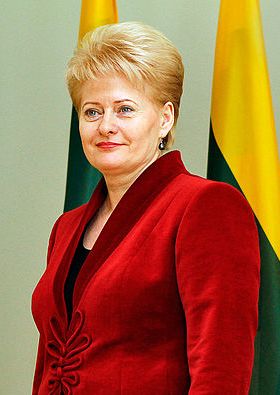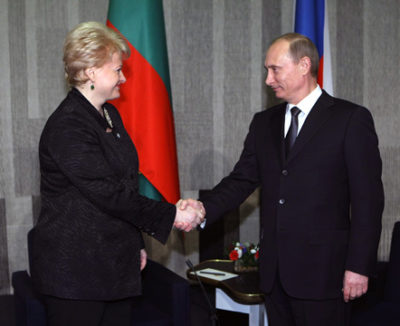A nation must think before it acts.

President of Lithuania Dalia Grybauskaite
Dalia Grybauskaite’s victory in Lithuania’s 2009 presidential elections and her insistence on altering her predecessor’s values-based, pro-American foreign policy suggested that she would pursue major foreign policy changes, particularly with two immediate neighbors—Belarus and Russia—and two Black Sea countries—Ukraine and Georgia. The incoming president signaled that development of pragmatic relations with Russia was of the utmost importance. She was also determined to change the tone of her country’s foreign policy toward the former Soviet republics by relinquishing “hysterical anti-Russian rhetoric.” The public seemed to welcome Grybauskaite’s plans, given the profoundly negative impact of the global financial crisis on Lithuania and the Baltic region as a whole. She also argued that Lithuania’s policy of isolating Belarus was unproductive and caused the loss of important economic opportunities.
Elevating the Importance of Belarus and Russia
Grybauskaite produced her first major political earthquake in September 2009 when she initiated a “thaw” by hosting Belarusian President Alexander Lukashenka in Vilnius. She explained her efforts to relax bilateral relations as part of the European Union’s (EU) campaign to promote democratization in Belarus through open dialogue, positioning herself in a win-win situation. On the one hand, if Belarus were to democratize, she could take full credit for the “thaw.” On the other hand, if Belarus were not to pursue democratization, Grybauskaite could blame Belarus for failing to take the opportunity. Thus, the president assumed that if circumstances demanded, she would have enough space for political maneuvering.
However, her approach did not bring the expected benefits. When Lukashenka unleashed brutal force against the opposition after Belarus’s 2010 presidential elections, Grybauskaite was quick to note that if elections had been fair and legitimate, there would be no need to use force. Eventually, the aftermath of the election produced a lasting political stalemate between the two states, while Grybauskaite’s personal ambition to achieve change resulted in her foreign policy toward Belarus coming to resemble that of her predecessor.
Lithuanian-Russian relations also changed quickly under Grybauskaite. On August 18, 2009, she unexpectedly called Russian President Dmitry Medvedev to discuss problems that Lithuanian companies were encountering in Russia. Both presidents apparently agreed to de-politicize economic relations and that Lithuanian businesses in Russia should operate on the same terms as domestic businesses. It was either her naiveté or a strategic oversight to assume that a phone call to Medvedev would lead to her desired outcome in bilateral relations. It was not Medvedev, but Prime Minister Putin (2008-2012) who controlled Russia. Not surprisingly, Grybauskaite’s initiatives produced no significant successes, and they stalemated until 2013 when the Euromaidan demonstrations and civil unrest erupted in Ukraine.

Gyrbauskaite meets (then) Prime Minister Putin. 2010.
However, Grybauskaite did score a small political victory. Her personal initiative broke an eight-year impasse between Lithuania and Russia, and the leaders of both countries were again in formal, albeit infrequent, communication. However, Grybauskaite’s direct and somewhat non-traditional approach to foreign leaders elicited criticism. According to a senior diplomat, “the president uses foreign policy as an opportunity to gather bonus points by publicly [calling or] appearing with some important foreign dignitary and then forgets about everything else. . . . For instance, when it became clear that [Grybauskaite] would not be able to meet with Dmitry Medvedev, the country’s relations with Russia were suddenly ‘forgotten,’ even if Grybauskaite assigned the entire credit exclusively to herself for initiating a thaw in bilateral relations in 2010.”[1]
Early in her first term, Grybauskaite sought to resolve long-standing disagreements without pressuring Moscow to democratize, but the Euromaidan crisis in 2013 and Russia’s takeover of Crimea in 2014 fundamentally altered her position toward Moscow. Within weeks of Russia’s annexation of Crimea, Grybauskaite adopted a much harder stance, describing Moscow’s actions as creating a de facto “state of war” with Europe and urging tough EU sanctions. She terminated dialogue with Moscow, choosing to adopt the “new cold warrior” role instead. She declared Russia a “terrorist state” because of its tactics in Ukraine and compared Putin to Stalin and Hitler.
Two key factors can explain Grybauskaite’s shift from rapprochement with Russia to overt belligerence. First, the Euromaidan crisis and the annexation of Crimea took place during the 2014 presidential election year in Lithuania when Grybauskaite was running for a second term. She needed to prove that she was no longer the 2009 president who sought good relations with a hostile neighbor and did not seek to relinquish anti-Russian “hysterics.” Indeed, her 2014 presidential campaign was largely built on an anti-Russian platform. Russia’s behavior encouraged Grybauskaite to characterize it as aggressive and prone to violence. Although she believed a Russian invasion of Lithuania was unlikely, hybrid warfare tactics such as information warfare and cyber-attacks were possible.
Second, the public mood had changed dramatically with the annexation of Crimea. There was a genuine concern that Lithuania would be the next Russian target. Most politicians agreed that a stronger stance against Russia—in words and deeds—was needed. They hiked military spending (a move Grybauskaite had rejected in 2010), reintroduced conscription, achieved energy independence from Russia, and issued a Survival Guidebook for the public in preparation for a possible invasion. Arguing that Lithuania was “already under attack,” Grybauskaite not only saw the need to strengthen the army, but also to show a personal resolve to “take up arms” herself to defend the country.
Due to this change in direction, Grybauskaite became one of Putin’s “solitary foes.” She enraged the Communist faction of the Russian Duma, which suggested sanctioning Lithuania and terminating diplomatic relations. Paradoxically, in 2016, the two states find themselves in the same stalemate as when Grybauskaite assumed the presidency in 2009.
Abandoning the Black Sea Region
Because one of Grybauskaite’s initial foreign policy priorities was improving relations with Russia, many analysts expected her to reduce Lithuania’s support for Ukraine and Georgia. Even if it was undiplomatic of Grybauskaite to refer to the Black Sea states as “beggars,” her public pronouncements reflected her priorities. She had no intention to spend her political capital in Georgia or Ukraine because she expected little payoff. In her view, it was naive to expect that Lithuania could lead the Black Sea states toward the EU and NATO. Vilnius had neither the resources nor the political weight to achieve such ambitious foreign policy goals. Therefore, Grybauskaite signaled that the Black Sea region would be downgraded in Lithuania’s foreign policy.
A major and unexpected shift occurred in mid-2013 when Lithuania assumed the Presidency of the Council of the EU and declared the Eastern Partnership one of the presidency’s key priorities. In hindsight, it should have been clear that it was unrealistic to expect that Lithuania’s EU presidency would lay the path for Ukrainian EU membership. If the EU Association Agreements with Eastern Partnership countries were to be signed, the Lithuanian president and the country’s diplomats had to be active in the region. But since these states ranked low on Grybauskaite’s foreign policy agenda, the chances of achieving this particular goal were small.
Russia’s aggression in Ukraine in 2014 not only changed the security environment in Eastern Europe, but also, according to Grybauskaite, Russia “has become a real threat on the continent of Europe.” Geopolitical realities forced Grybauskaite to change her stance toward Ukraine as she sought closer ties with Kiev and advocated sanctions on Russia.
Grybauskaite’s foreign policy toward Russia and the Black Sea states receives mixed evaluations. Some analysts argue that there has been little noticeable change since early in her first term—or rather that the change was mostly that of rhetoric, not action. Others claim that Grybauskaite significantly changed when events of 2013-2014 forced her to return to her predecessor’s values-based foreign policy.
Ultimately, Grybauskaite continues to struggle with the question of Lithuania’s direction after its main goal of membership in NATO and the EU was achieved in 2004. Answering this question and establishing her legacy may be an important goal for Grybauskaite as she concludes her second term in 2019.
[1] Veidas 2011, no. 26, p. 14.



